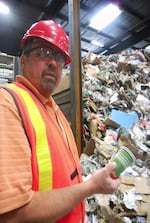
Keith Ristau, President of Far West Fibers, pulls a disposable coffee cup out of a pile of curbside recycling.
Amanda Troxler / OPB
Washington recyclers are worried they could soon have no place to send your discarded paper and plastics. That’s because China has decided the U.S. is letting food and garbage contaminate too much of its unwanted milk jugs and other recyclables.
China is the biggest buyer of recyclable plastic, paper and metal from the U.S. Starting next year, China will no longer take our recyclables. They say those materials are coming over with food scraps or types of plastic that can’t be recycled.
No more unclean chili cans. No more of the wrong types of plastic. No more things that just get tossed in recycling containers: junk like garden hoses or grocery store plastic bags.
By the end of the year, China will only accept products that have a 0.3 percent contamination rate, something industry groups said is "virtually unattainable."
That’s left Northwest recyclers in a lurch. Oregon has been asked to allow recyclers to ship customers’ paper, plastic and metal materials to landfills.
"The problem is it has nowhere to go," said Julie Miller of the Oregon Department of Environmental Quality, in an earlier interview with EarthFix. "Recycling centers are filling up with material."
In Washington, recycling is most often handled at the city and county levels. That means it’s difficult to tell how each municipality is handling the upcoming changes.
Brad Lovaas is with the Washington Refuse and Recycling Association. He said Friday that could mean more of the state’s recycling could be headed for the trash heap.
“If it comes to it, and they hold to this ban, if they hold to the contamination levels, there will be no market for many of the things that we collect in our curbside and commercial recycling programs right now,” Lovaas said. “There’s just no way to replicate what China consumes right now anywhere.”
Lovaas said recyclers are going to have to slow down the processing and sorting of products to meet the new standards.
That could mean, in the near term, many recyclables will be headed to the landfill — it’s not safe or healthy to just store them somewhere until further notice.
Washington’s recycling rate is around 50 percent, Lovaas said, which is above the national average, as are Oregon and California’s recycling rates. That’s one reason the West Coast is feeling the pinch of losing its biggest recyclable buyer.
“We still are questioning whether we can attain the levels that — at least right now — (China) is dictating,” Lovaas said.
Right now, Lovaas said consumers should still continue to recycle. Just check with local programs to make sure you know the rules — and throw things away if you aren’t sure if they can be recycled.
